Spirit of Service
By Caroline Njenga
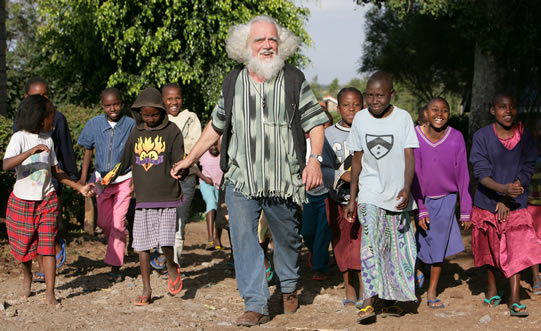
Renato Kizito Sesana, known to many simply as Fr. Kizito, is a kind and compassionate man. Born Renato Sesana in Italy, the award-winning missionary requires little introduction. From the alleys of Kibera and Riruta to Milan, from the Nuba Mountains to the city of Rome, from Lusaka to Portugal, Fr. Kizito is as famous as he is admired.
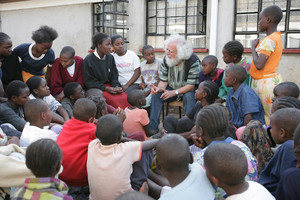
Fr. Kizito is a man of many hats. He is a priest, nurse, engineer, business administrator, teacher, pacifier, missionary, journalist and a prolific writer. Such is his dazzling CV, that few can claim to equal him. Yet he humbly says: “I am just a simple missionary. Everything else is meant to make my mission work effective.” He has injected hope and “resuscitated” many souls and bodies.
Service to the Poor and the Young
Kizito is passionately engrossed in mission, is committed to the poor and has a determination to uplift their lives. This is evident in his latest project of Domus Marie Secondary School in Ngong, in the outskirts of Kenya’s capital Nairobi. I met Fr. Kizito at Shalom House, along Ngong road. Shalom is one of Kizito’s shrines, were he searches for justice and comfort for the deprived. He is a busy man, running projects in Kenya, Sudan and Zambia. In 1980, he founded and became president of Koinonia Community, an organization of lay Catholics committed to mission work. At Shalom there is a buzz of activities taking place. “Shalom” (or peace) led to the establishment of Africa Peace Point, which is linked to Italy’s Peacelink. Africa Peace Point offers training on peace for east Africa and the great Lakes Region. At Shalom it is a home for the homeless and voice for the voiceless.
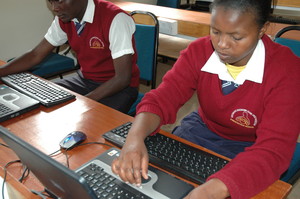
We are going to one of the new projects which Koinonia established last January, the Domus Marie Secondary School in Ngong. I asked Fr. Kizito why he was no longer writing “Kizito’s Notebook”, which many Kenyans read in one of the local dailies before he stopped.
“The Nation newspaper is still asking me to resume my collaboration and I had accepted but I realized I could not do it, so I called the editor told them I don’t think I can.”
On Wednesdays, Fr. Kizito meets the students at the secondary school, which is mixed although the boys board and the girls are day pupils. The students meet in the chapel where they get to discuss issues affecting the country and picked from the local dailies, and analyze them. It is a quite interesting exercise. To learn from a man who writes a book every two years and collaborates in different missionary magazines across the world is inspiring to the students, who look up to Fr. Kizito as their mentor.
His dressing code is simple: a pair of fading jeans, old sports shoe and a t-shirt. He is a simple man and a modest missionary.
Fr. Kizito is a skilled writer, yet describes his writing as a hobby. He enjoys communication and writing on human relationships; he has ten titles to his name, most of them on people. Since 1998, he has made a habit of writing a book every two years, in Italian. Some of the books have been translated into English.
Kizito inspired the publication of the Big Issue Kenya, a magazine for social justice, and Newsfromafrica, an online magazine. In Nairobi, he founded the New People magazine in 1989 and, in 2003, Radio Waumini 88.3, where he is now a consultant. Waumini, he says, “is a remarkable success story for a Catholic radio station in Africa”. The project took five years of hard work.
Domus Marie Secondary School
His project, the Domus Marie Secondary School – which means House of Mary – opened its doors on 15 January 2008. It started off with a student enrolment of 57; 19 of them come from various homes run by Koinonia. The idea of starting a secondary school came out of the need to give high quality education to the young people and also to give a chance to the students who finish primary education from the four homes for former street children that Koinonia is running.
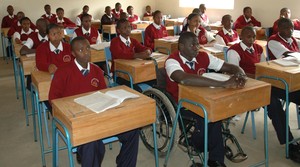
Fr. Kizito tells me: “When our children finish primary education, we see that they are generally bright and doing well in their studies. We know that even in secondary school they can perform well, but we realize that it is especially difficult for them to do so in public secondary schoola. We have seen boys and girls who are very bright and have the chance of going ahead in their education, but they do not perform well at the end of the four years because the quality of education at the public secondary school is not up to the standard.
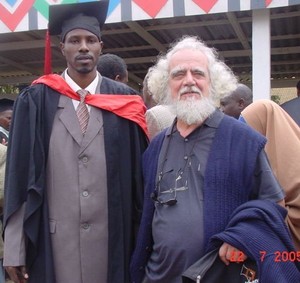 This is the reason why we decided to start the school and for us this is a chance to give quality education to these students.”
This is the reason why we decided to start the school and for us this is a chance to give quality education to these students.”
“We have students, ” Fr. Kizito continues, “who are very bright and want to continue with their studies. We want to give them a good chance in our school, because we think that if we take them to a private school it is going to cost us a lot. This is why we thought that the best option was to build a secondary school and guarantee a very high level of education, where the children who do not have the means to pay can have a free education; although the school is also open to students whose parents can afford the fees. Our priority is to give quality education, not only on the academic level, but on the human and spiritual levels as well.”
Fr. Kizito adds that the school is also in touch with a famous Kenyan philosopher, Professor Wanjohi, who is also his close friend. “Wanjohi has had a dream for many years of teaching philosophy to secondary and primary school children. Not philosophy as a school subject, but as a life subject that teaches them to make sound judgements in life; and as a subject that helps them build values in life and to be critical people who are ready to think for themselves and not just follow the masses.”
In a world where information technology is taking over every aspect of our day to day lives, Fr. Kizito says that all school going children should have the knowledge and skills of being computer literate. That is why computer classes are going to be a compulsory subject for all students in Domus Marie Secondary School. “This is our first experiment of a secondary school,” Fr. Kizito says, “we have two primary school and a teacher training institute in Sudan, in the Nuba Mountains; but it is quite different from what we have here, in Kenya. This being our first secondary school, we have selected people very carefully, especially our teachers, for it to be success.
“This is a big achievement for the whole of the Koinonia Community, because we have seen how difficult it is to provide good human and spiritual education to the young people. Through Domus Marie, we aim at providing quality education for our own children and for those who wish to try with us, experimenting a new way of education.”
Fr. Kizito repeats that he wants this school to form citizens and people who have their own values and who are convinced of their own ideas. From the passion in his voice, it is evident that the students who are going to join Domus Marie are going to get a high quality education.
© New People Magazine.



